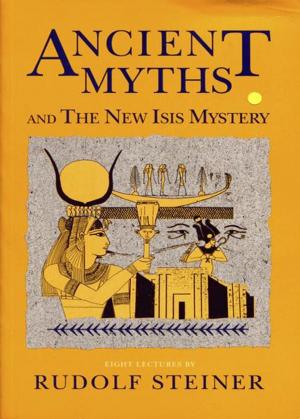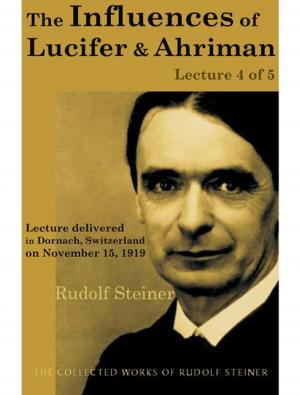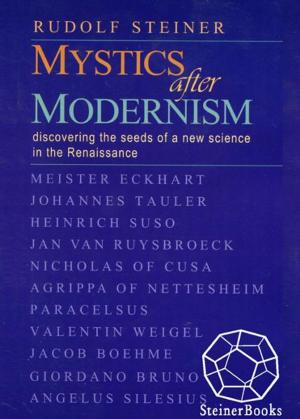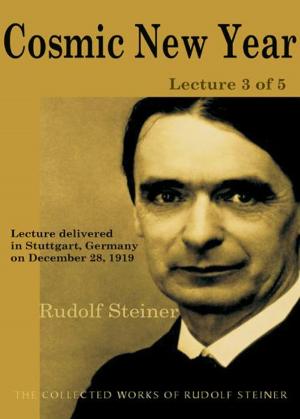A Life for the Spirit
Nonfiction, Reference & Language, Education & Teaching, Educational Theory, Philosophy & Social Aspects| Author: | Henry Barnes, Robert McDermott | ISBN: | 9780880108614 |
| Publisher: | SteinerBooks | Publication: | July 1, 1997 |
| Imprint: | SteinerBooks | Language: | English |
| Author: | Henry Barnes, Robert McDermott |
| ISBN: | 9780880108614 |
| Publisher: | SteinerBooks |
| Publication: | July 1, 1997 |
| Imprint: | SteinerBooks |
| Language: | English |
Few people today recognize Rudolf Steiners name, yet those who are aware of him know that his presence pervades every forward-looking aspect of contemporary life. Nearly all fields of life have been fructified by his insightsnot abstractly or theoretically, but in a concrete way that changes lives. No wonder, then, that Steiner has been called the best kept secret of the twentieth century. Born in 1861 in Kraljvec, Austria, Rudolf Steiner early showed evidence of the most varied giftsa precise and probing scientific mind combined with a natural clairvoyant ability to see into the spiritual world, a determined need to think things through for himself, and a profound reverence for the divine. He first made his mark as a philosopher and the editor of Goethes scientific writings. He also recognized the revolutionary spirit in Nietzsche. But Steiners destiny led him in a different direction. Profound cognitive experiences determined that his task would lie in service to the spirit. While recognizing the integrity of modern sciences phenomenological empiricism, he also knew that the time had come to extend the field of science to include investigation of the supersensible. Working at first within the Theosophical Society, but always speaking and writing out of his own experience, Steiner developed the foundations for a thoroughly modern spiritual-scientific discipline that would transform spiritual and cultural life. Until his death in 1925, in countless lectures and books, Steiner created the body of knowledge and practice known as anthroposophy, which not only challenged and extended the underlying methods of modern knowledge, but stimulated many practical cultural initiatives such as: Waldorf education, biodynamic agriculture, the art of eurythmy, the movement for a threefold social order, and anthroposophical medicine. In A Life for the Spirit, Henry Barnes recounts the dynamic life of this remarkable man. He does so by placing Steiner in the crosscurrents of history and showing him not as a spectator or ivory-tower philosopher, but as a leading actor in the drama, one whose entire being was given in service to humanity and to the spirit.
Few people today recognize Rudolf Steiners name, yet those who are aware of him know that his presence pervades every forward-looking aspect of contemporary life. Nearly all fields of life have been fructified by his insightsnot abstractly or theoretically, but in a concrete way that changes lives. No wonder, then, that Steiner has been called the best kept secret of the twentieth century. Born in 1861 in Kraljvec, Austria, Rudolf Steiner early showed evidence of the most varied giftsa precise and probing scientific mind combined with a natural clairvoyant ability to see into the spiritual world, a determined need to think things through for himself, and a profound reverence for the divine. He first made his mark as a philosopher and the editor of Goethes scientific writings. He also recognized the revolutionary spirit in Nietzsche. But Steiners destiny led him in a different direction. Profound cognitive experiences determined that his task would lie in service to the spirit. While recognizing the integrity of modern sciences phenomenological empiricism, he also knew that the time had come to extend the field of science to include investigation of the supersensible. Working at first within the Theosophical Society, but always speaking and writing out of his own experience, Steiner developed the foundations for a thoroughly modern spiritual-scientific discipline that would transform spiritual and cultural life. Until his death in 1925, in countless lectures and books, Steiner created the body of knowledge and practice known as anthroposophy, which not only challenged and extended the underlying methods of modern knowledge, but stimulated many practical cultural initiatives such as: Waldorf education, biodynamic agriculture, the art of eurythmy, the movement for a threefold social order, and anthroposophical medicine. In A Life for the Spirit, Henry Barnes recounts the dynamic life of this remarkable man. He does so by placing Steiner in the crosscurrents of history and showing him not as a spectator or ivory-tower philosopher, but as a leading actor in the drama, one whose entire being was given in service to humanity and to the spirit.















